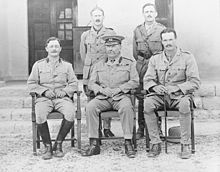Percy Sykes
| Sir Percy Molesworth Sykes | |
|---|---|

Brigadier Sir Percy Sykes with officers of original Mission Bandar Abbas, April 1916. (Standing) Major E Howell, Captain Durham, (Seated) Major G. Blair (Staff Officer) Brig General Sir Percy Sykes, Captain R.C. Ruck.
|
|
| Birth name | Percy Molesworth Sykes |
| Born | 28 February 1867 |
| Died | 11 June 1945 (aged 78) |
| Allegiance |
|
| Service/branch |
|
| Rank | Brigadier General |
| Unit | 16th Lancers, 2nd Dragoon Guards (Queens Bays) |
| Commands held | Consul-General Khuzestan, |
| Battles/wars | Second Boer War |
| Awards |
Knight Commander of the Order of the Indian Empire Companion of the Order of the Bath Companion of the Order of St Michael and St George |
Brigadier-General Sir Percy Molesworth Sykes, KCIE, CB, CMG (28 February 1867 – 11 June 1945) was a soldier, diplomat, and scholar with a considerable literary output. He wrote historical, geographical, and biographical works, as well as describing his travels in Persia.
Percy Sykes was born in Brompton, Kent, England the only son of Rev. William Sykes and his wife Mary Molesworth, and educated at Rugby School and the Royal Military College, Sandhurst. He was the nephew of Richard Sykes the rugby player who founded towns in America, and cousin of Sir Alan Sykes, 1st Baronet who was MP for Knutsford, Cheshire.
Sykes was commissioned into the 16th Lancers, but transferred to the 2nd Dragoon Guards in 1888. He was posted to India and made several journeys through Persia and Baluchistan. He was sent on a secret mission in November 1892 when he went to Uzbekistan on the Trans-Caspian Railway. Promotion to lieutenant followed on 26 April 1895, and to captain on 8 December 1897. During the Second Boer War he served as second in command of the 9th Battalion, Imperial Yeomanry until September 1901. He later served with the Intelligence Department and was wounded in the leg. He was appointed a Companion of the Order of St Michael and St George (CMG) in the 1902 Coronation Honours list on 26 June 1902 In late 1902 he transferred to the Indian Army, and was Consul at Kerman in Persia. Over the next few years he made extensive journeys in the Middle East and was appointed consul-general for Khūzestān in 1906.
...
Wikipedia
